Overview
The utilization of sterile filter syringes in laboratories presents a multitude of advantages. These include:
- The prevention of contamination
- Heightened efficiency in filtration processes
- Adherence to regulatory standards
Notably, these syringes uphold specimen integrity, effectively reducing operational costs by minimizing the need for re-runs due to contamination. Furthermore, their user-friendly designs contribute to improved workflow, thereby emphasizing their critical role in achieving accurate and reliable laboratory results. In summary, the incorporation of sterile filter syringes is essential for laboratories aiming for excellence in their operational practices.
Introduction
Sterile filter syringes have emerged as indispensable tools in laboratories, where the integrity of samples is of utmost importance. These devices not only prevent contamination but also significantly enhance the accuracy and reliability of analytical results, providing substantial advantages across various scientific disciplines.
However, a pressing challenge persists: how can laboratories ensure they are fully maximizing the benefits of these innovative tools while adhering to stringent regulatory standards? This article explores the ten key benefits of using sterile filter syringes, underscoring their critical role in maintaining sample purity and optimizing laboratory workflows.
JM Science Sterile Filter Syringe: Ensuring Contamination-Free Samples
JM Science's sterile filter syringe is meticulously engineered to ensure that specimens remain uncontaminated, a critical factor for precise drug and medicine testing. This is especially relevant when employing advanced techniques such as the AQ-300 Coulometric and AQV-300 Volumetric Karl Fischer Titrators, adhering to the standards set by the Japanese Pharmacopoeia.
By utilizing high-quality materials and sophisticated manufacturing methods, these devices significantly minimize the risk of introducing foreign particles or microorganisms, which is essential for preserving the integrity of analytical results. In sensitive applications such as drug formulation and testing, even minimal contamination can lead to substantial errors in data interpretation.
Laboratory experts emphasize the importance of maintaining contamination-free specimens; as one specialist noted, 'A single contaminant can disrupt months of effort, jeopardize product safety, or invalidate research results.' The ongoing risks of microbial contamination in pharmaceuticals underscore the necessity for stringent microbiological quality control measures.
Practical examples illustrate this point: a study revealed that contamination rates in multi-dose eye drops surged from 12% to 58% after just one week of use, highlighting the critical role of the sterile filter syringe in preserving specimen integrity.
As we approach 2025, the emphasis on contamination-free specimens remains paramount, as improper microbiological quality can diminish drug efficacy and pose risks to patient safety. JM Science also offers extensive support resources, including how-to videos and application libraries, reinforcing its unwavering commitment to quality and customer support.
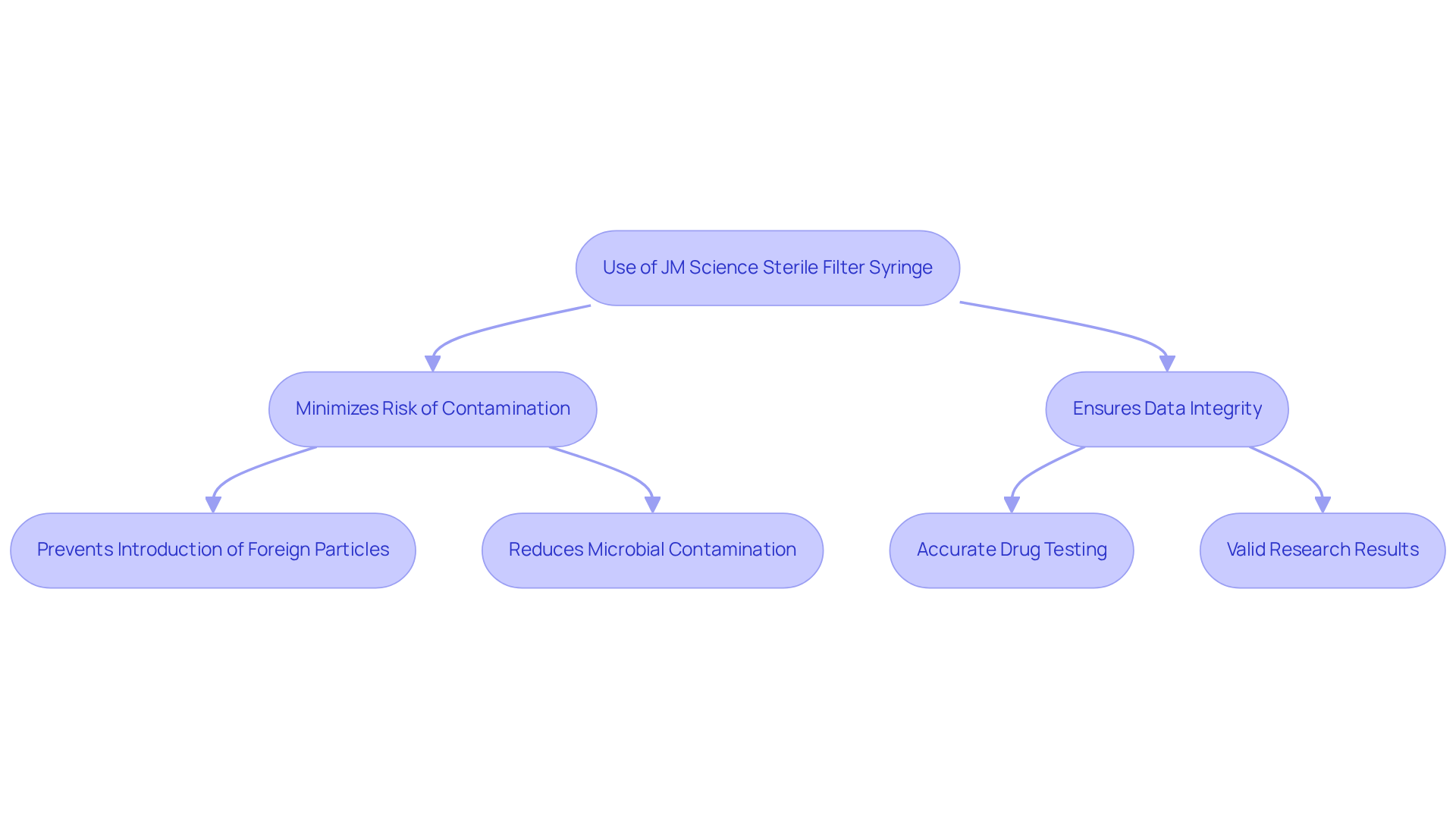
Prevent Contamination: The Role of Sterile Filter Syringes in Sample Integrity
Sterile filter syringes are essential for safeguarding against contamination, utilizing screens designed to trap particulates and microorganisms. This functionality is vital for experiments requiring high precision, ensuring that only uncontaminated specimens are processed.
When selecting a sterile filter syringe, critical factors such as membrane material and pore size must be considered to guarantee compatibility with the liquid being processed. By effectively minimizing the risk of cross-contamination between specimens, these devices significantly contribute to the validity of test results and enhance the overall reliability of analyses.
In various research environments, including pharmaceutical studies, microbiology assessments, and environmental evaluations, the implementation of sterile filter syringes has proven to be a best practice for preserving specimen integrity and achieving accurate results.
As Jessica Turner, a certified professional, asserts, 'In a medical setting, ensuring the purity of samples is paramount to obtaining accurate results.' This adaptability underscores the importance of sterile filter syringe devices across multiple applications, highlighting their indispensable role in maintaining the integrity of scientific work.
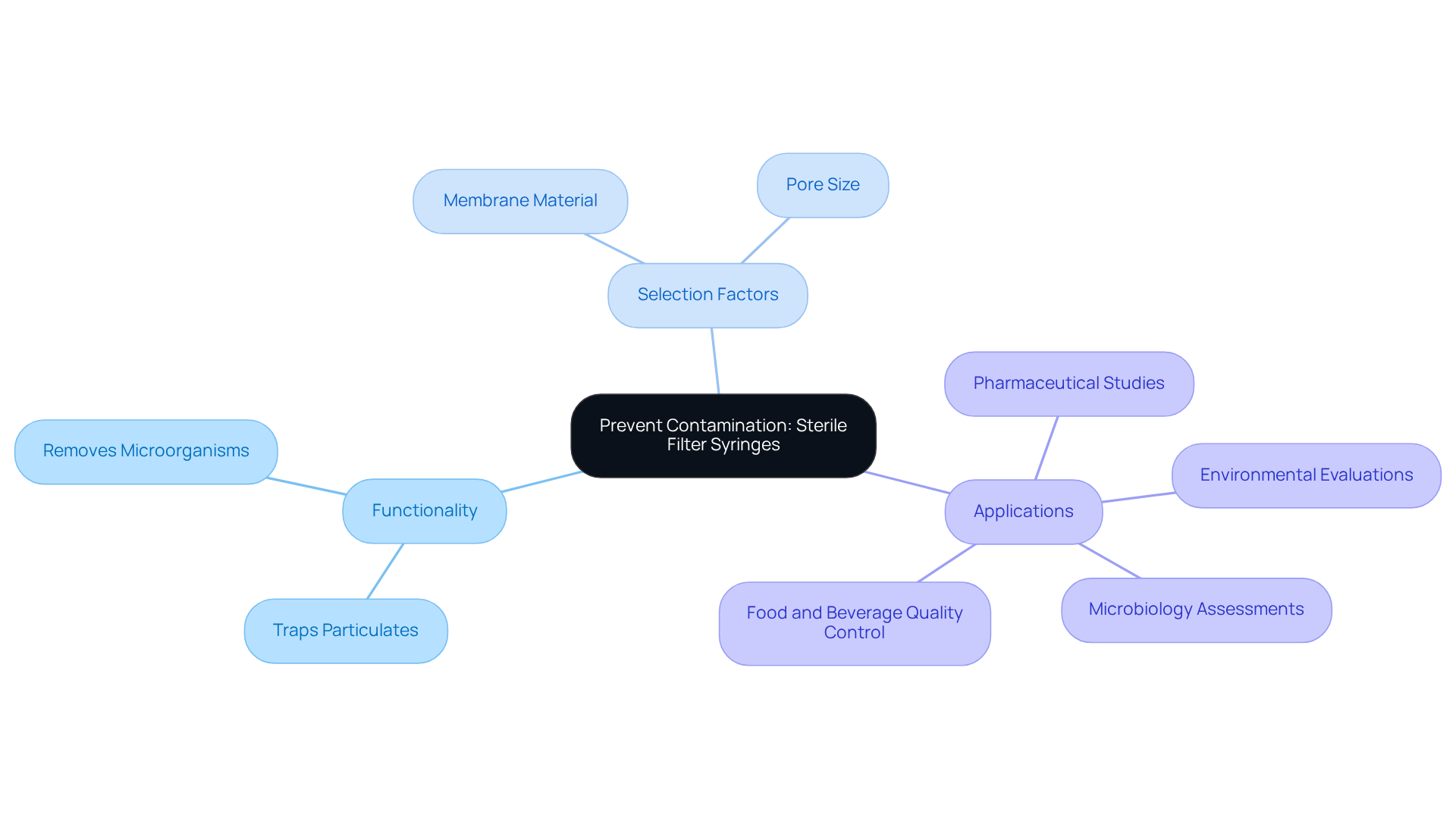
Enhance Efficiency: Streamlining Filtration Processes with Sterile Syringes
Utilizing a sterile filter syringe significantly enhances filtration processes within testing facilities. Their innovative design facilitates the rapid preparation of materials, thereby substantially reducing the time allocated to filtration tasks. This efficiency is particularly vital in high-throughput environments, where swift processing is essential.
By utilizing a sterile filter syringe to streamline the sample filtration processes, research facilities can bolster productivity, allowing scientists to concentrate on critical tasks. Lab managers have noted that the integration of sterile syringe systems has led to productivity increases of up to 30%. This was evidenced by a case study in which a research laboratory improved filtration efficiency through the use of these tools and by educating staff on optimal methods.
Furthermore, the global syringe purification market was valued at USD 16.77 billion in 2023 and is projected to reach USD 27.7 billion by 2031, expanding at a compound annual growth rate of 6.72%. This trend underscores the increasing reliance on tools like the sterile filter syringe to preserve integrity and enhance analytical precision.
In high-throughput facilities, the efficacy of sterile injection devices not only accelerates workflows but also ensures adherence to stringent quality control standards. Employing optimal methods, such as using a new screen for each sample and handling screens by the edges to prevent contamination, results in more reliable research outcomes.
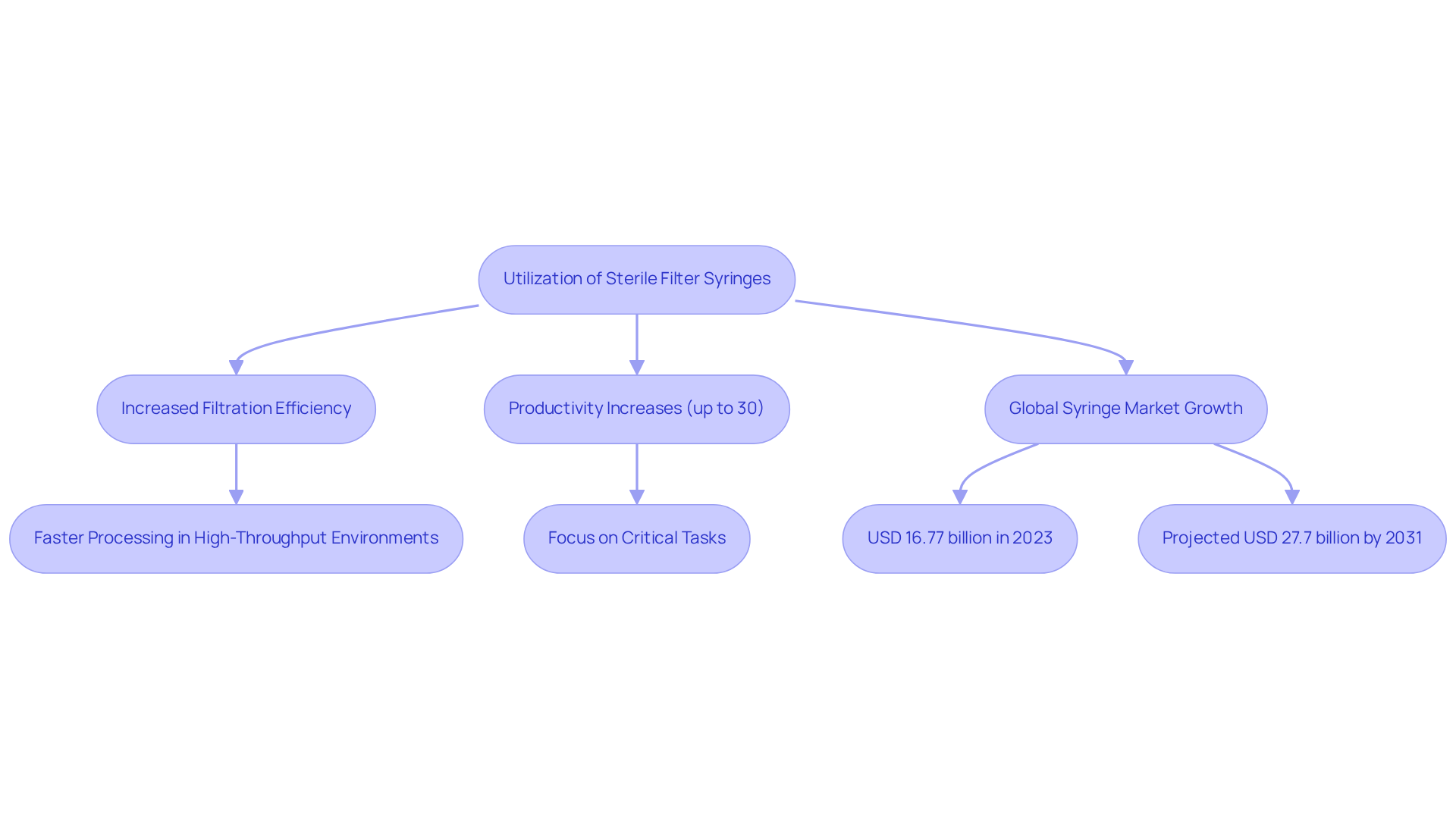
Maintain Compliance: Adhering to Regulatory Standards with Sterile Filters
Sterile strainers are indispensable in research facilities striving to meet stringent regulatory standards. Manufactured under controlled conditions, the sterile filter syringes undergo frequent validation for critical applications, ensuring adherence to the guidelines established by regulatory authorities. This compliance is vital, as any deviation can result in substantial operational setbacks, including hefty fines and jeopardized research integrity.
As we approach 2025, the importance of sterile membranes in maintaining compliance is underscored by the increasing scrutiny from regulatory bodies, which emphasizes the need for reliable purification solutions to ensure drug purity and safety. The market for syringe purification, particularly involving sterile filter syringes, is projected to grow significantly, reaching USD 33.1 billion by 2034, reflecting the rising demand for effective filtration techniques.
By employing sterile strainers, facilities enhance their operational efficiency while safeguarding the safety and efficacy of their results, ultimately supporting advancements in research and healthcare. Specific applications of sterile filtration, such as final product processing and active pharmaceutical ingredient filtration, further demonstrate the essential role of these tools in achieving compliance. Moreover, the availability of encapsulated cartridges in both single-use and reusable formats offers laboratories flexible options to fulfill their filtration requirements.
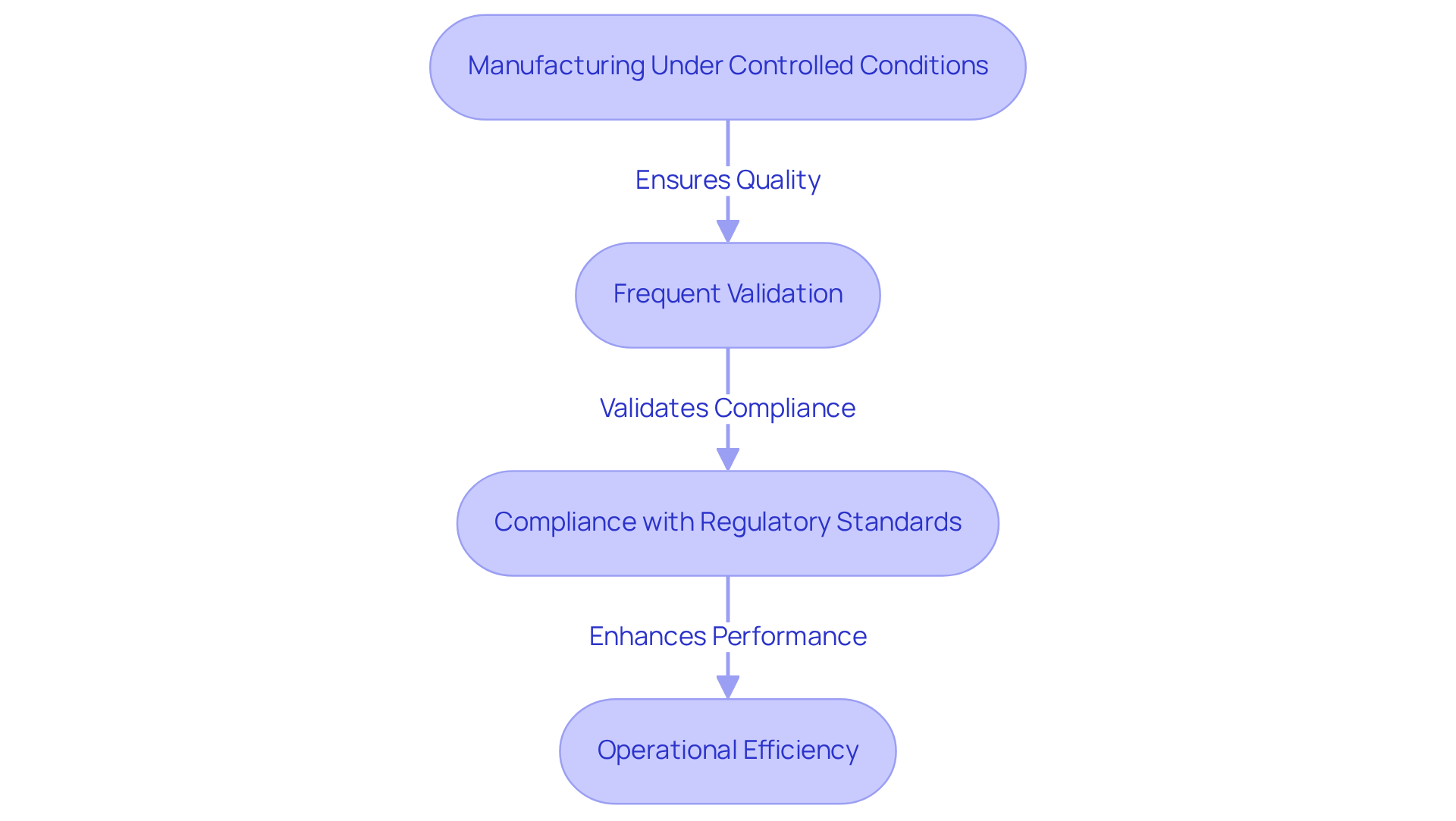
Versatile Applications: Utilizing Sterile Filter Syringes Across Scientific Disciplines
Sterile membranes for injection are pivotal in various scientific domains, including chemistry, biology, and medical diagnostics. The efficacy of a sterile filter syringe in filtering samples renders it essential for numerous applications, such as preparing samples for chromatography and ensuring the purity of biological assays. For instance, in chromatography, a sterile filter syringe with pore sizes of 0.2 microns and 0.45 microns is vital for removing particulates that could obstruct columns, thereby preserving the integrity of the analysis. In biological assays, the sterile filter syringe and these membranes play a crucial role in eliminating contaminants, ensuring accurate and reliable results.
The versatility of these devices allows facilities to standardize their filtration processes, significantly enhancing overall efficiency and reliability. Researchers have observed that the ability to select from a range of pore sizes and membrane materials provides tailored solutions for specific applications, whether in pharmaceutical development or environmental testing. This adaptability streamlines workflows and bolsters rigorous quality control measures across diverse scientific fields. As Jinming Zhou articulated, "The Nylon Syringe Filter has become an essential tool in the research toolbox as experts and researchers seek effective methods to achieve accurate results." Furthermore, the cost-effectiveness of the sterile filter syringe makes it an attractive option for research facilities aiming for economical solutions without compromising quality.
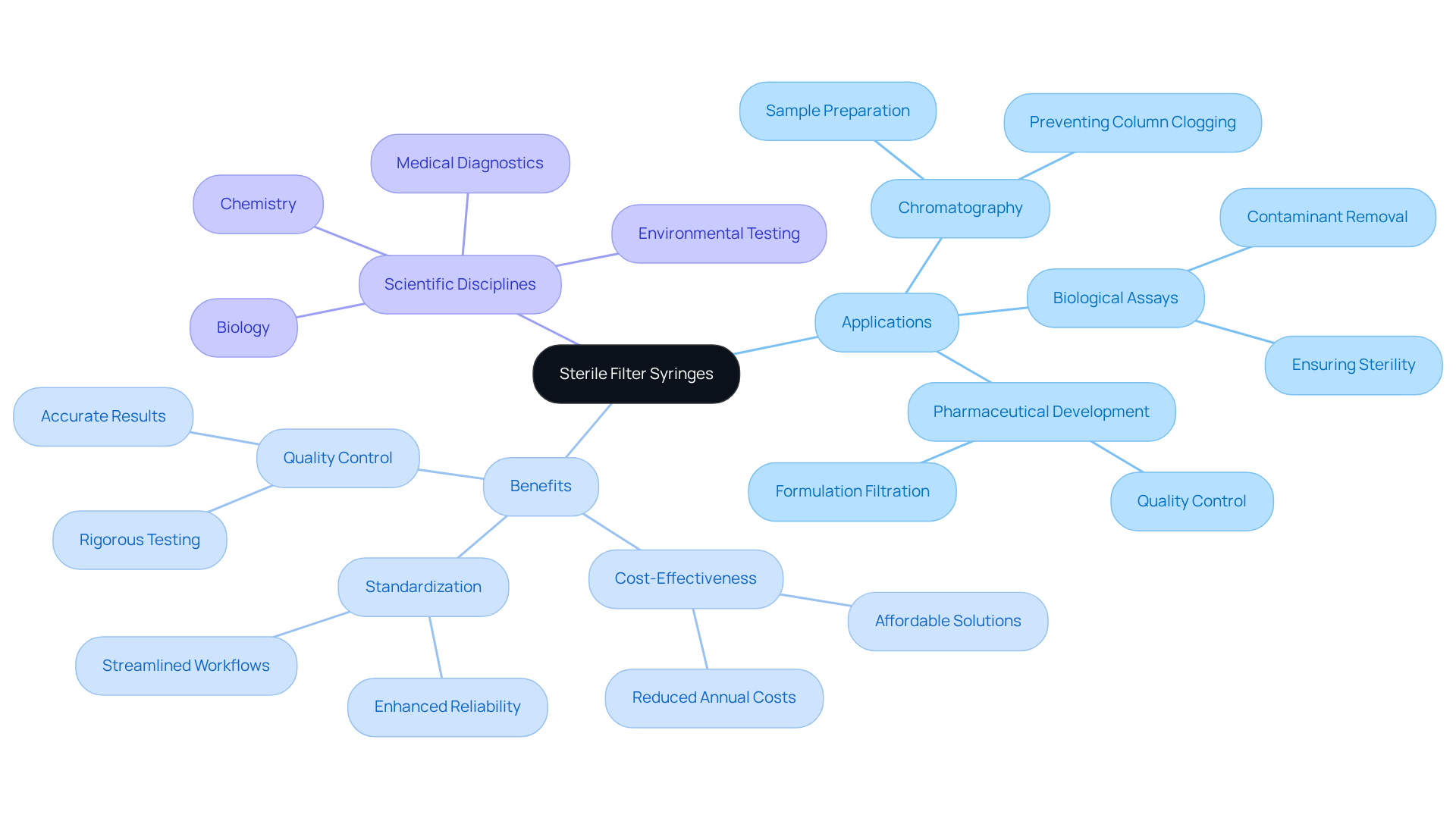
Cost-Effective Solutions: The Economic Benefits of Sterile Filter Syringes
Investing in sterile filter syringes presents substantial financial advantages for research facilities. The sterile filter syringe plays a crucial role in effectively preventing contamination, thereby preserving the integrity of samples. This significantly decreases the incidence of costly re-runs and minimizes material waste. Recent data reveals that testing facilities can experience re-run rates due to contamination exceeding 20%, which directly translates into increased operational costs.
Furthermore, the efficiency of sterile filter syringes in separation processes leads to diminished labor expenses, as they require less time for sample preparation and management. Looking ahead to 2025, the anticipated cost reductions associated with the adoption of sterile filtration devices are projected to reach approximately $1.5 million for medium-sized research facilities. This underscores their importance as a strategic investment for organizations aiming to optimize their budgets while ensuring high-quality outcomes.
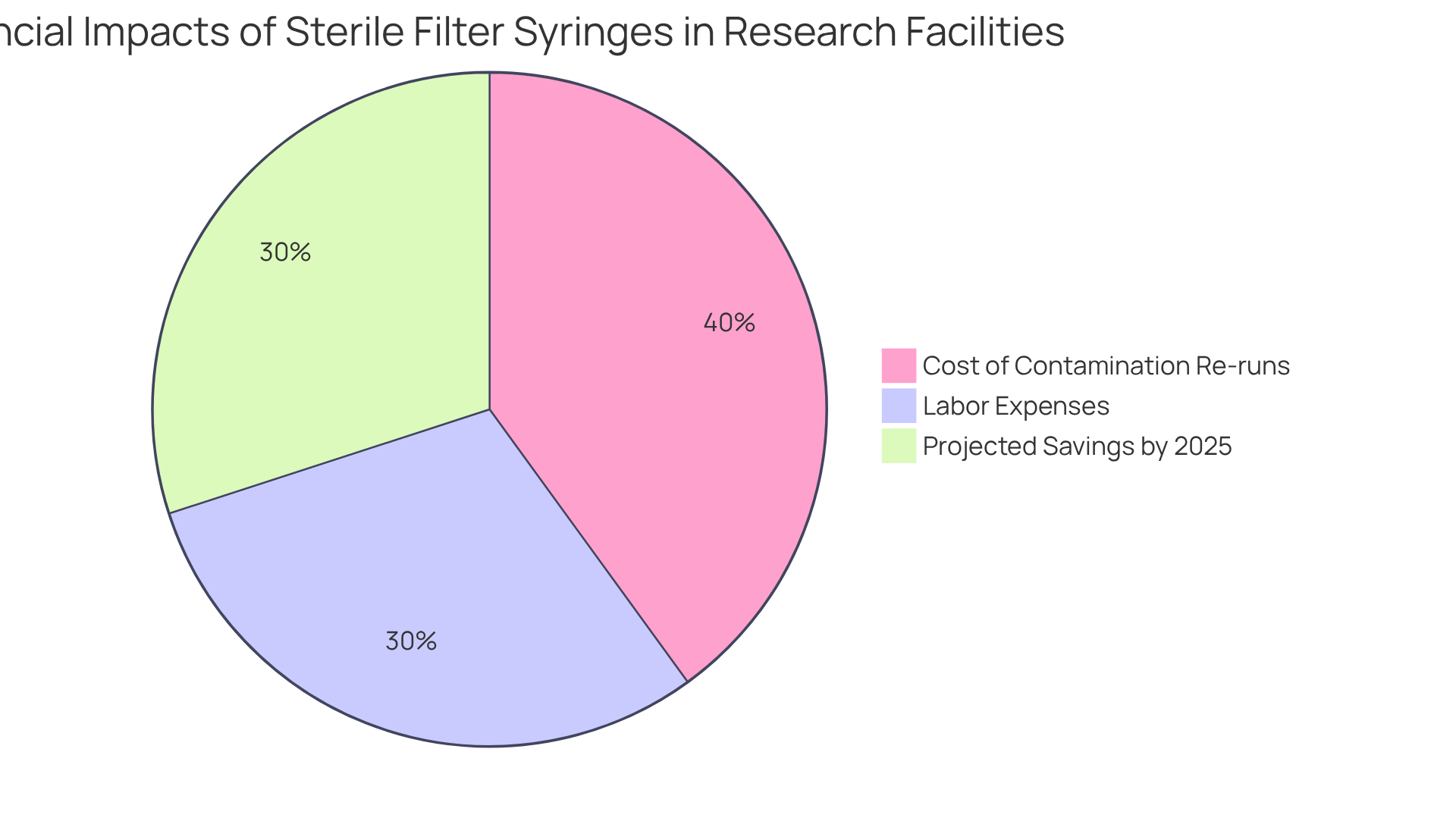
User-Friendly Design: Improving Lab Workflow with Sterile Filter Syringes
The accessible design of sterile filter syringes significantly enhances workflow in research settings. Ergonomic grips, clear markings, and user-friendly mechanisms render these syringes accessible to all staff, irrespective of their experience level. This ease of use not only reduces the learning curve for new personnel but also minimizes the likelihood of user errors, leading to more consistent and reliable outcomes in analyses.
Notably, studies reveal that training time for new employees can be diminished by up to 30% when employing user-friendly syringe designs. Furthermore, the syringe strainer market was valued at approximately USD 820 million in 2023, projected to grow to USD 1.36 billion by 2032, underscoring the increasing significance of these instruments in research facilities.
Laboratory personnel have acknowledged that ergonomic features enhance workflow efficiency, with one technician remarking, 'The comfort and ease of use of these syringes have transformed our daily operations, allowing us to focus more on our analyses rather than struggling with equipment.'
Additionally, around 52% of private testing facilities and contract research organizations are increasing their budgets for sterile filter syringe procurement, signaling a shift towards investing in superior filtration solutions.
Overall, the impact of ergonomic design on workflow is profound, cultivating an environment where precision and efficiency flourish.
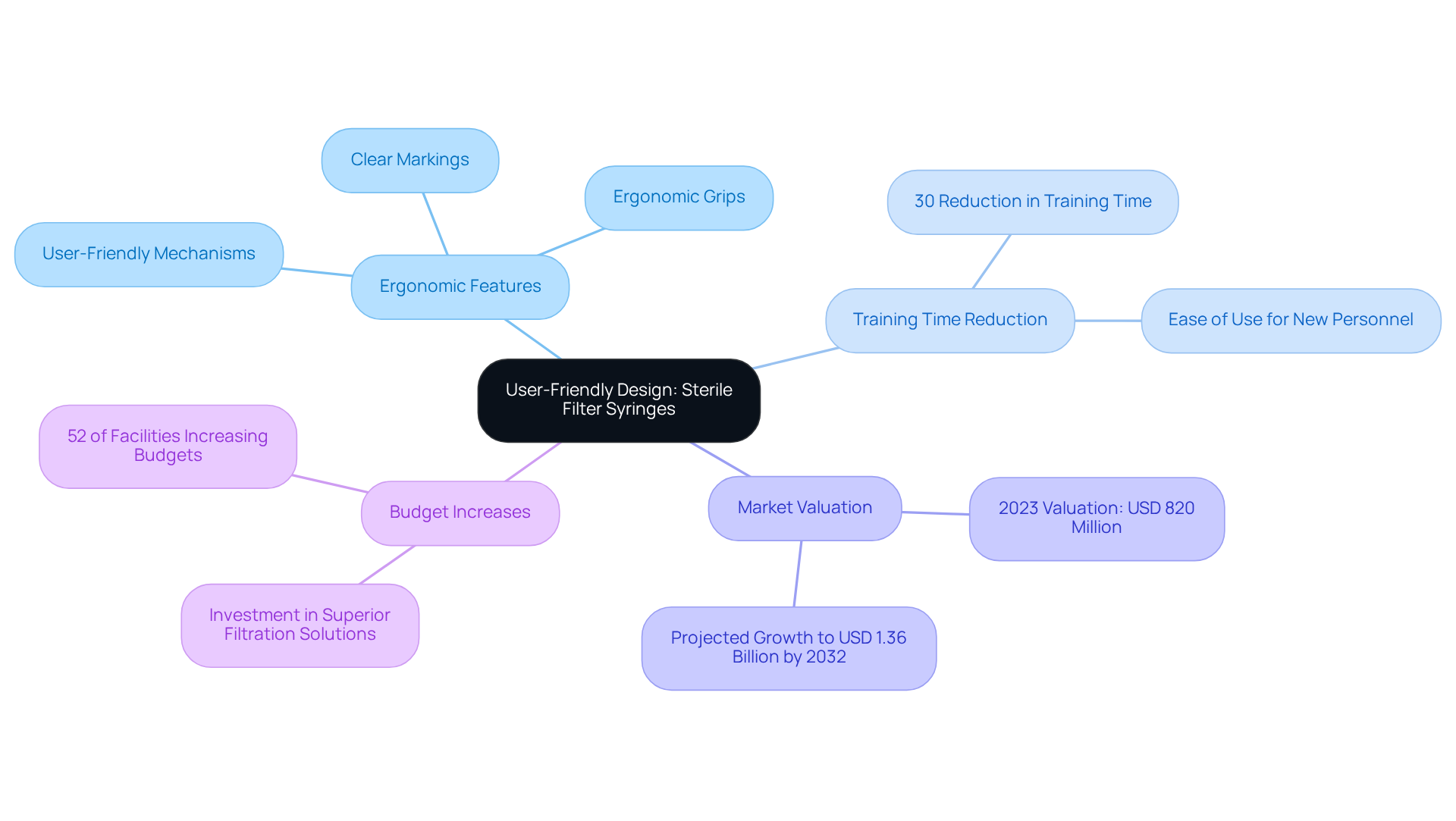
Achieve Accurate Results: The Importance of Reliable Filtration with Sterile Syringes
Reliable filtration is essential for obtaining accurate results in laboratory experiments. Sterile filter syringes play a crucial role in ensuring that specimens remain free from contaminants that could jeopardize results, significantly enhancing the validity of analytical data. Studies have demonstrated that even minor contaminants can lead to substantial variations in outcomes; research suggests that the purity of specimens can enhance analytical data validity by as much as 30%.
By employing a sterile filter syringe, laboratories can confidently assert that their results are based on untainted materials, which is vital for informed decision-making in research and development. For instance, a pharmaceutical laboratory reported a 25% increase in reproducibility after introducing sterile filter syringes into their procedures.
Esteemed researchers emphasize that preserving purity is critical for dependable research results, with one stating, "The integrity of a specimen is paramount; even the slightest impurity can change the trajectory of an experiment." This commitment to quality not only fosters trust in research findings but also supports advancements in various scientific fields, including pharmaceuticals and medical diagnostics.
JM Science Inc. distinguishes itself in this regard by providing top-notch sterile filter syringes that assist laboratories in upholding strict purity standards.
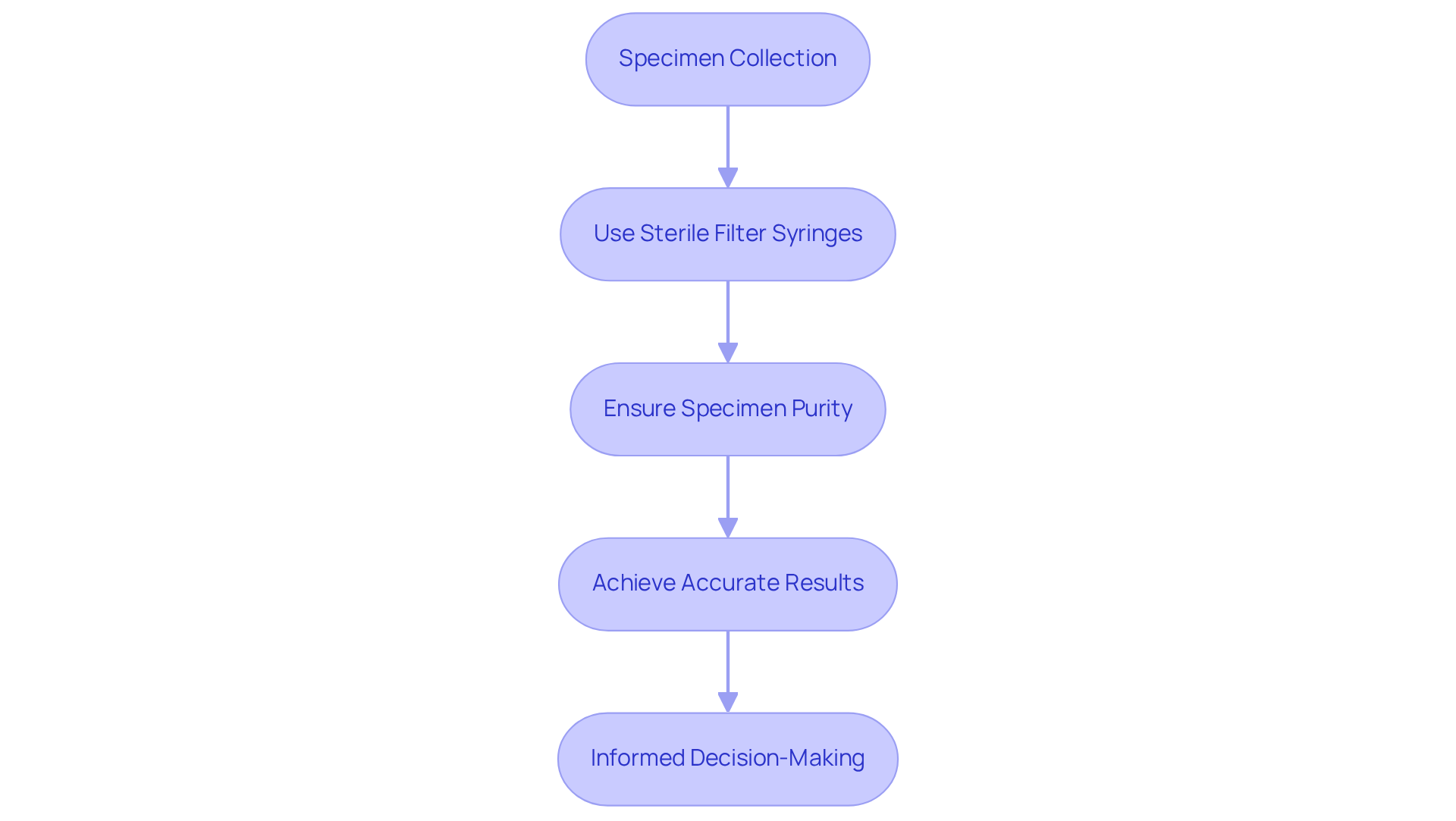
Protect Sensitive Samples: The Safeguarding Role of Sterile Filter Syringes
The role of sterile filter syringes is pivotal in safeguarding delicate specimens from contamination and degradation. Their innovative design features superior chemical resistance and exceptional filtration efficiency, effectively shielding specimens from environmental factors such as light, temperature, and moisture—elements that can jeopardize their integrity.
For example, light exposure can result in photodegradation, while temperature fluctuations may alter the chemical composition of specimens. By employing a sterile filter syringe for filtration, facilities can ensure that specimens remain viable for examination and testing, thereby enhancing the reliability of outcomes.
Researchers emphasize the critical nature of preserving specimen integrity, noting that even minor contamination can lead to significant inaccuracies in analytical results. The robust design of sterile strainers not only prevents contact with harmful substances but also aids in the preservation of delicate analytes, establishing them as essential tools in modern scientific practices.
As we move towards 2025, the role of the sterile filter syringe in protecting samples will continue to be vital in ensuring the precision and dependability of test results.
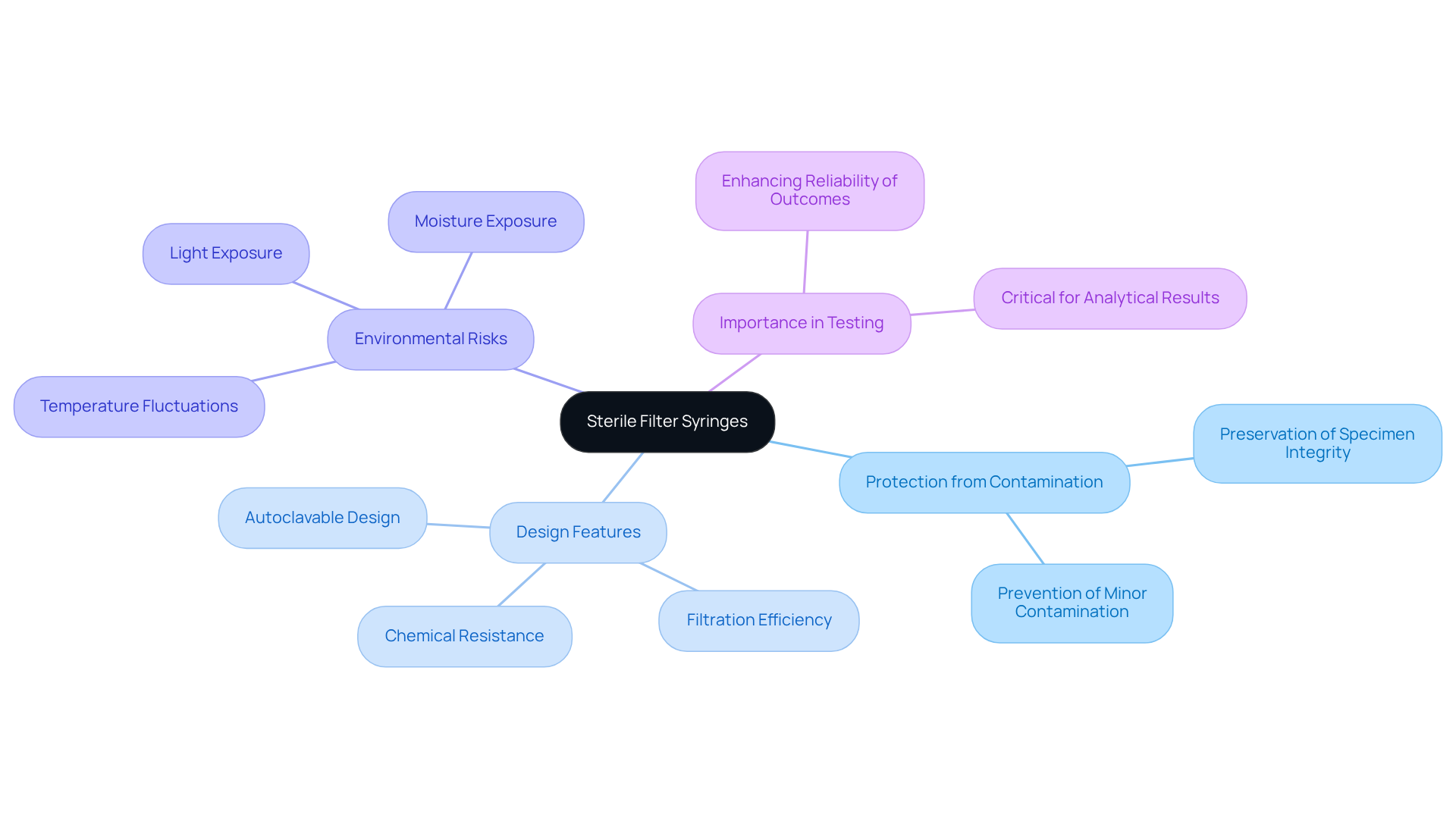
Innovative Technology: Advancements in Sterile Filter Syringe Design and Functionality
Recent advancements in sterile syringe technology have led to enhanced designs and functionalities that significantly improve performance in research settings. Innovations such as integrated screens, advanced materials, and customizable options empower facilities to tailor their purification processes to specific needs. These technological improvements not only boost efficiency but also contribute to superior overall outcomes in laboratory analyses. Consequently, the use of sterile filter syringes has become an indispensable tool in modern scientific research, underscoring the importance of high-quality instruments in achieving reliable results.
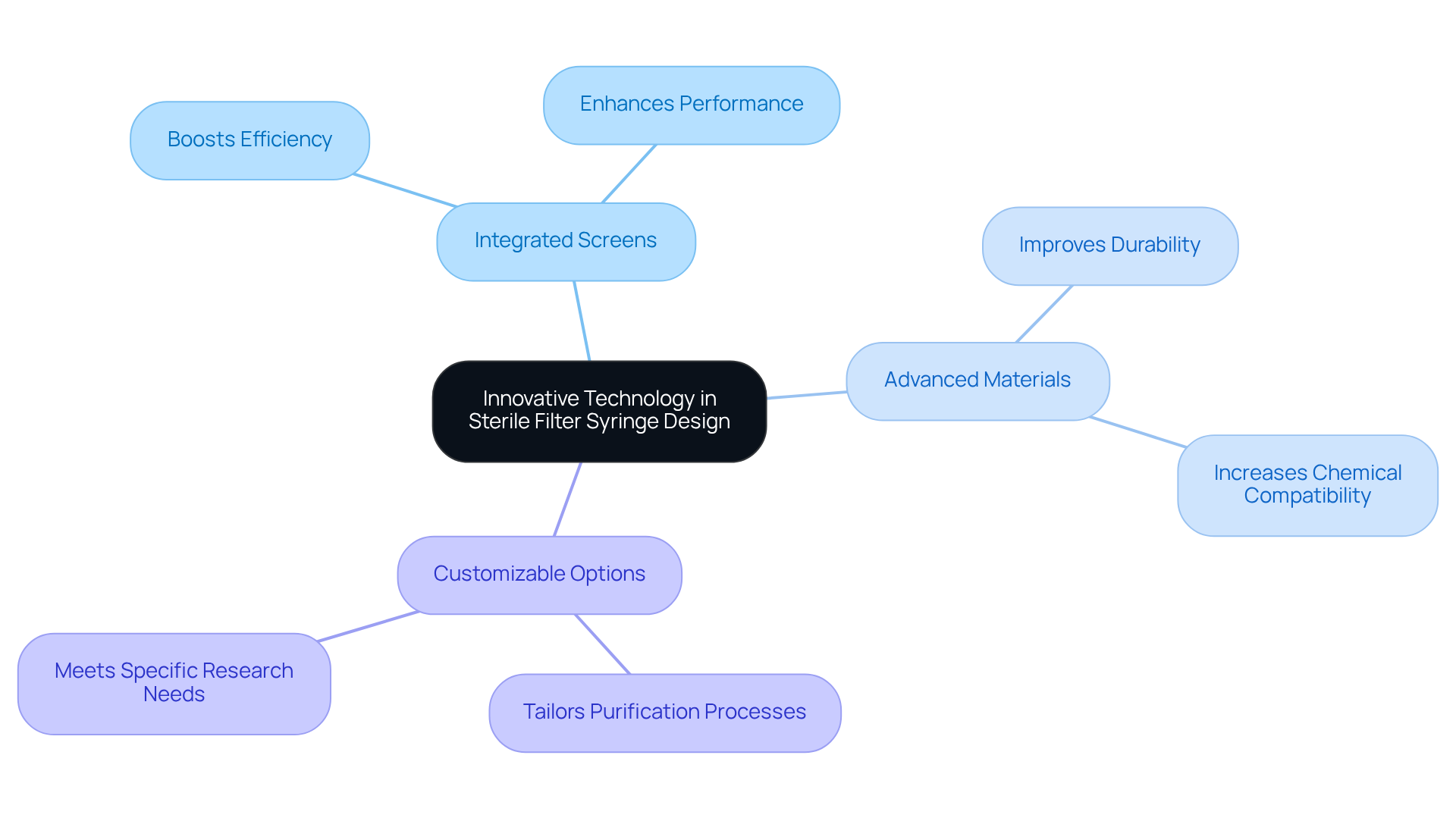
Conclusion
Utilizing sterile filter syringes in laboratory settings is essential for ensuring sample integrity and achieving accurate results. These devices are specifically designed to prevent contamination, making them indispensable tools for researchers who must maintain the purity of their specimens. By employing high-quality sterile filter syringes, laboratories can significantly enhance the reliability of their analyses while adhering to stringent regulatory standards.
Throughout this discussion, various benefits of sterile filter syringes have been highlighted, including:
- Safeguarding against contamination
- Streamlining filtration processes
- Enhancing overall efficiency in laboratory workflows
The importance of selecting the right membrane material and pore size has also been emphasized, as these factors are critical for achieving optimal results across diverse scientific disciplines. Moreover, the economic advantages associated with using these syringes, such as reduced re-run rates and lower operational costs, further underscore their value in research environments.
In conclusion, the integration of sterile filter syringes into laboratory practices transcends convenience; it is a crucial step toward ensuring the accuracy and reliability of scientific outcomes. As the demand for high-quality filtration solutions continues to grow, investing in these advanced tools will not only enhance research efficacy but also contribute to the overall safety and integrity of pharmaceutical and medical advancements. Embracing the benefits of sterile filter syringes represents a proactive approach to fostering innovation and excellence in scientific research.




